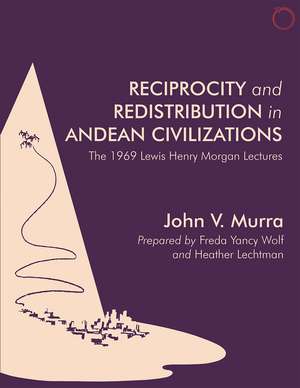Reciprocity and Redistribution in Andean Civilizations: The 1969 Lewis Henry Morgan Lectures
Autor John V. Murraen Limba Engleză Paperback – 21 dec 2017
Murra intermixes a study of Andean ecology with an exploration of the ideal of economic self-sufficiency, stressing two foundational socioeconomic forces: reciprocity and redistribution. He shows how both enabled Andean communities to realize direct control of a maximum number of vertically ordered ecological floors and the resources they offered. He famously called this arrangement a “vertical archipelago,” a revolutionary model that is still examined and debated almost fifty years after it was first presented in these lecture. Written in a crisp and elegant style and inspired by decades of ethnographic fieldwork, this set of lectures is nothing less than a lost classic, and it will be sure to inspire new generations of anthropologists and historians working in South America and beyond.
Preț: 107.88 lei
Preț vechi: 125.12 lei
-14% Nou
Puncte Express: 162
Preț estimativ în valută:
20.64€ • 21.61$ • 17.08£
20.64€ • 21.61$ • 17.08£
Carte indisponibilă temporar
Doresc să fiu notificat când acest titlu va fi disponibil:
Se trimite...
Preluare comenzi: 021 569.72.76
Specificații
ISBN-13: 9780997367553
ISBN-10: 0997367555
Pagini: 122
Ilustrații: 10 color plates
Dimensiuni: 216 x 279 x 13 mm
Greutate: 0.43 kg
Editura: HAU
Colecția HAU
ISBN-10: 0997367555
Pagini: 122
Ilustrații: 10 color plates
Dimensiuni: 216 x 279 x 13 mm
Greutate: 0.43 kg
Editura: HAU
Colecția HAU
Notă biografică
John V. Murra (1916–2006) was a leading anthropologist and scholar of the Inca Empire. He taught at a variety of institutions, including Yale University, Cornell University, Vassar College, the University of Puerto Rico, and Universidad de San Marcos. He is the author or coauthor of many influential books on Andean civilization, including The Economic Organization of the Inca State and Anthropological History of Andean Polities.
Cuprins
Foreword
Introduction
Lecture One
The Archipelago Model of Vertical Control in the Andes
Lecture Two
Reciprocity, the Anthropological Alternative to Exotic Explanations
Lecture Three
The Inca Attempt to Destroy the Markets
Lecture Four
Structural Changes in Tawantinsuyu prior to the European Invasion
Glossary
Mapa Ecológico del Perú
Juhn V. Murra Bibliography
Reference List
Index
Introduction
Lecture One
The Archipelago Model of Vertical Control in the Andes
Lecture Two
Reciprocity, the Anthropological Alternative to Exotic Explanations
Lecture Three
The Inca Attempt to Destroy the Markets
Lecture Four
Structural Changes in Tawantinsuyu prior to the European Invasion
Glossary
Mapa Ecológico del Perú
Juhn V. Murra Bibliography
Reference List
Index
Recenzii
"John Victor Murra (1916–2006) was lauded as the dean of Central Andean studies from the 1960s through the 1980s, particularly because of his championing of the idea of vertical archipelagos, allowing local access to resources in compressed ecological zones as the mechanism of organization and risk reduction for the Inca state, and his downplaying of the importance of the llama caravan trade. Murra’s ideas changed the direction of scholarly research for the next generation and opened new understanding of the Inca state. The editors, two of Murra’s students, transcribed the tapes of his four 1969 Lewis Henry Morgan Lectures, in which he set out in English his complete ideas for vertical ecology, and provide the historical rationale for his arguments. The title topics of the four lectures—archipelago model, reciprocity, the Inca attempt to destroy markets, and Inca structural change in Tawantinsuyu—fairly accurately encompass the arguments in each nearly 50-year-old lecture. The book will be key for students of the history of Andean studies. The volume is supported by 14 figures, a five-page glossary, and scattered footnotes. Recommended."
"The transcriptions in the book bring to life the oral quality of the presentations... They provide a vivid contribution to the interdisciplinary historiography of anthropology, archaeology, and history."
